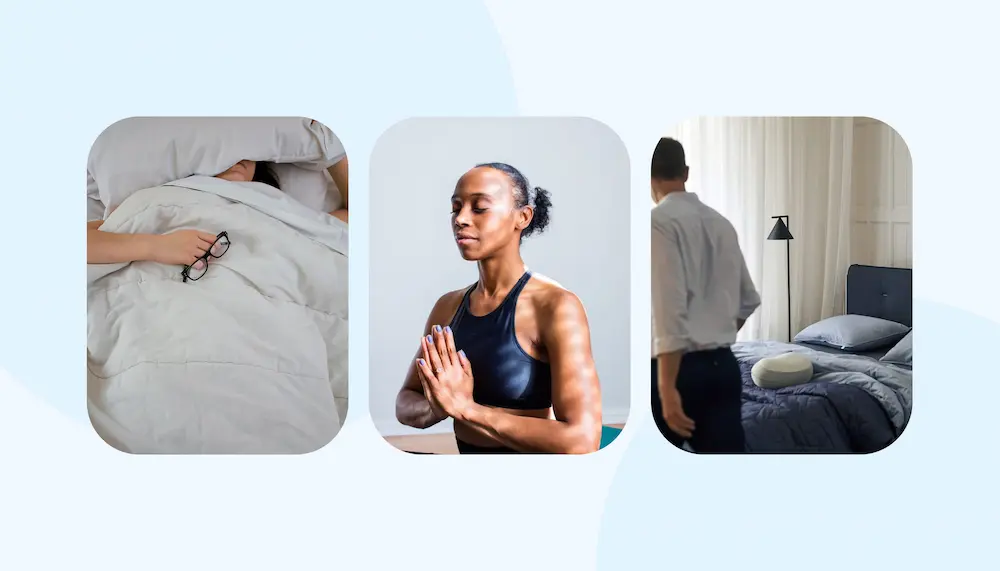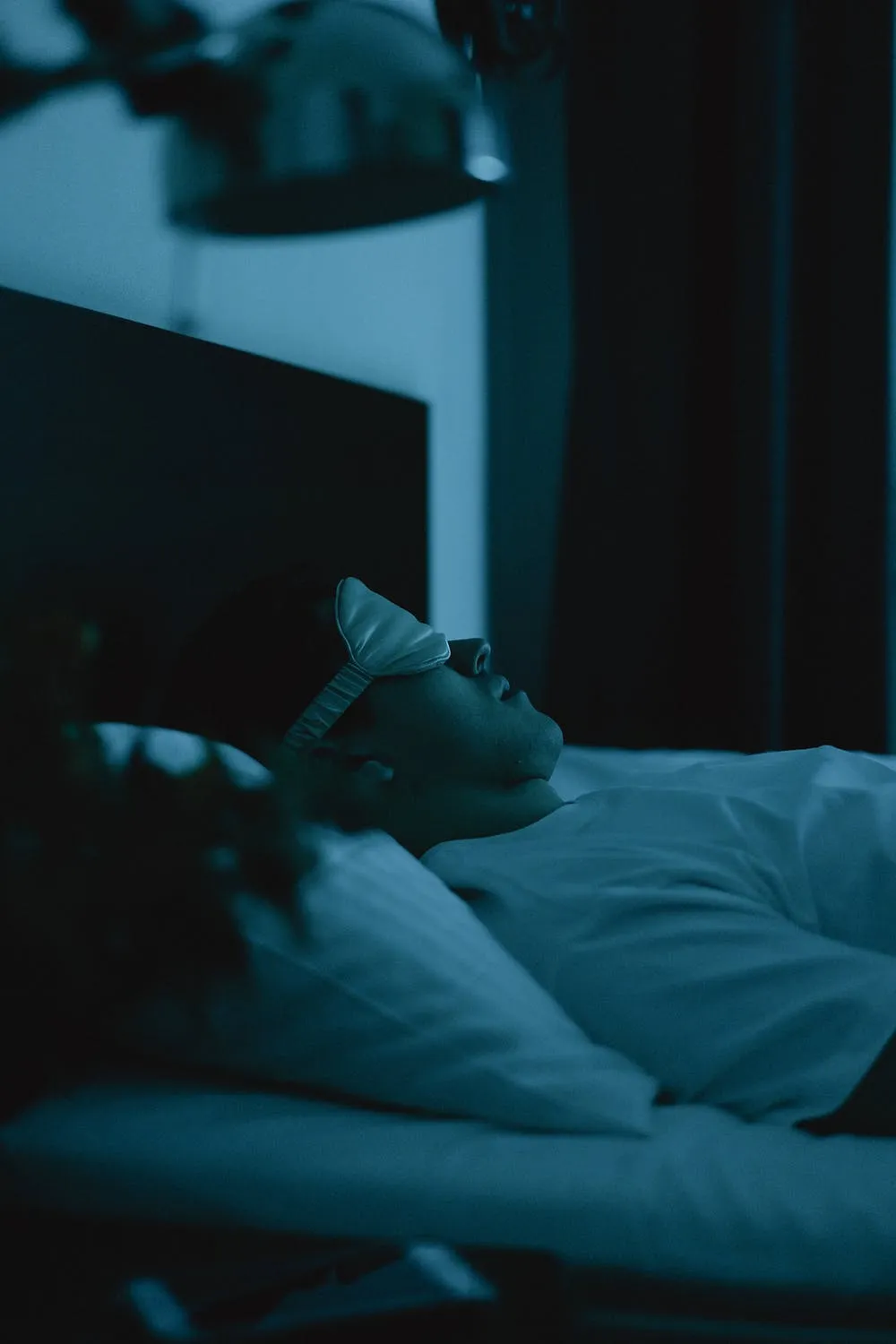All posts
What Is the Relationship Between Mental Health and Sleep?

Circle Medical Staff
Oct 24, 2023
11 min

Sleep is incredibly important for both our physical and mental health, yet many people don’t get the amount of sleep they need. Not only do you need to get enough sleep each night to maintain good mental health, but you also need to make sure you’re getting quality sleep. Even if you sleep for hours, you may wake up feeling groggy. This lack of quality sleep can then have an impact on your mental health. But what is this link? And how can you improve your sleep? In this guide, we’ll be exploring the link between these two and give you some tips for improving sleep quality and your overall mental health. Read on to learn more.
An Introduction To Sleep
First, what is sleep anyway? It seems like a simple question, but we actually don’t fully understand its scientific biological purpose. Of course, it is very evident that we need sleep and that a lack of sleep can lead to significant health consequences. When we get good sleep, we feel much better, and our brains and bodies can function more optimally. When we don’t get good sleep, our mental health can suffer and result in issues such as anxiety, depression and other mental health disorders. So, we know that sleep is beneficial for both our mental and physical health. For mental health specifically, sleep quality has a strong link with emotional regulation and cognitive function. Let’s take a look at these two factors more closely.
Emotional Regulation
Emotional regulation is essential for maintaining good mental health. If you’re unable to regulate your mood, you may feel anxious, irritable, depressed and experience other negative emotions. A lack of quality sleep can also feed into existing mood disorders, exacerbating and triggering symptoms. On the other hand, when we prioritize quality sleep, we generally see improvements in emotional regulation and mood. This is why good sleep habits are often recommended as a lifestyle change to help reduce symptoms of any number of mood and mental health disorders. In short, sleep makes us better equipped to handle our daily stressors, which means our mood is generally more stable.
Cognitive Function
Sleep is also strongly linked to cognitive function. Cognitive function refers to our brain’s ability to process information, think, reason and make decisions. When we don’t get enough quality sleep, studies have shown that our cognitive abilities can suffer. You may notice that after a bad night of sleep, you have difficulty concentrating, making decisions and remembering things. These issues can compound if you consistently miss out on sleep. On the flip side, getting enough sleep can enhance our cognitive function and give us the ability to think more clearly, retain information and focus on tasks. Now that we’ve established the ways that sleep helps our brain let’s take a deeper dive into the link between sleep and our mental health.
Understanding Mental Health
First, let’s do a brief introduction to mental health. Our mental health encompasses our emotional and psychological well-being. Just like our physical health, neglecting mental health can lead to significant negative outcomes to overall health. Mental health issues can impact our daily lives and reduce their quality. Mental health can be influenced by several factors, such as genetics, life experiences and family history. If you make sure to take care of your mental health, you can live a happier and fuller life. By understanding our mental health and understanding the mental health issues you may be struggling with, you can make sure to take the right steps toward improving it and living better. Often, this will involve a combination of mental health treatments, which will likely include improving your sleep habits if you already have issues with sleep.
Exploring the Link Between Sleep Disorders & Mental Health Conditions
Sleep disorders and mental health conditions are typically strongly linked. While one can exist without the other, it’s very common for someone to struggle with both. Mental health conditions like anxiety and depression can contribute to the development of sleep disorders, and sleep disorders can worsen existing mental health conditions. If a sleep disorder persists, it can even trigger a new mental health issue, and the vicious cycle will continue. However, since we understand that there is a link between sleep disorders and mental health conditions, we can take steps toward treatment and ensure that individuals struggling with these conditions can get the help they need to improve their quality of life.
The Effects of Poor Sleep and Sleep Deprivation
Poor sleep quality and sleep deprivation can lead to an array of both physical and mental health problems. These problems can worsen as you continue to miss out on sleep regularly.
For mental health, poor sleep can lead to irritability, mood swings, difficulty managing stress, impaired cognitive function, difficulty focusing, impaired memory retention, difficulty making decisions and worsened mental health conditions like depression and anxiety.
For physical health, poor sleep can lead to drowsiness, fatigue, falling asleep during the day, decreased athletic performance and more. This is just the short-term, as persistent poor-quality sleep can lead to chronic health problems like cardiovascular disease, cognitive decline and a weakened immune system.
As you can see, it is crucial to prioritize sleep and establish healthy sleep habits to maintain optimal mental and physical well-being.
How To Support Your Mental Health
Now that we’ve talked about the link between sleep and mental health let’s talk about some general tips for supporting your overall mental well-being. Remember, if you’re experiencing a sleep disorder or a mental health condition, it’s best to speak to a health care professional to determine the best course of treatment. With that in mind, here is some advice for maintaining good mental health.
Sleep Hygiene Habits
One of the best ways to improve your sleep, and consequently your mental health, is by improving your sleep hygiene. Sleep hygiene refers to the habits you have around sleep, such as your sleep routine and the sleep environment you have. Here are some of the best ways to improve your sleep hygiene:
- Create a consistent sleep schedule — Make sure to go to bed and wake up at the same time every day, even on weekends. This will help set your internal clock and teach your body when it’s time to wake up and when it’s time to start feeling tired for bed.
- Create a comfortable sleep environment — Make sure you create an ideal environment for restful sleep. This means keeping your room dark, quiet and cool.
- Avoid caffeine, alcohol and big meals before bed — Caffeine and alcohol can disrupt your sleep cycle and make it more difficult to stay asleep throughout the night. Big meals before bed can also kick-start your digestion, which will keep your body active and make it more difficult to fall asleep.
- Get outside during the day — It’s a good idea to get some outside time and daylight, as this can help regulate your circadian rhythm and set your internal clock.
- Create a relaxing and enjoyable bedtime routine — Create a routine that you do before bed every night that relaxes you and gets you ready for a good night’s sleep. This may include taking a warm bath, reading a book or enjoying a cup of herbal tea.
- Exercise — Exercise can help you sleep more soundly at night, but make sure to avoid exercise too close to bedtime. This can keep your body awake and active, making it more difficult to wind down for the night.
By implementing these simple habits, you can improve the quality of your sleep and support your overall mental well-being.
Cognitive Behavioral Therapy for Insomnia (CBT-I)
Another highly effective treatment for both sleep disorders and mental health disorders is cognitive behavioral therapy for insomnia (CBT-I). Cognitive behavioral therapy focuses on identifying and challenging negative thought behaviors you have and redirecting them in a more positive direction. It also helps you to identify behaviors and habits that may be contributing to your sleep problems at night. Along with identifying these patterns, CBT also works on equipping you with strategies to cope with these patterns and gives you the tools to improve your sleep quality and improve your overall mental health.
Mindfulness and Relaxation Techniques
Mindfulness and relaxation techniques can also help with both sleep and mental health issues. Mindfulness and relaxation techniques focus on reducing stress and calming both the body and mind. Some techniques you might incorporate into your daily routine could be deep breathing exercises, meditation, progressive muscle relaxation and journaling. These practices can help provide a respite from the demands of daily life and give you a chance to unwind and breathe.
Seeking Professional Help
Finally, you should always seek the advice and guidance of a health care professional when you’re experiencing symptoms of sleep disorders or mental health disorders. They can provide you with an official diagnosis, which is the first step toward getting a comprehensive treatment plan that will put you on the path to better sleep and improved mental health.
Connect with a doctor or online provider
The first step to seeking help for mental health and sleep disorders will be speaking to a primary care provider. Fortunately, health care is more accessible than ever, and you can seek primary care services online from the comfort of your home. Online providers can diagnose, create treatment plans, prescribe medication when appropriate, refer you to specialists and do essentially everything that you can get with in-person care. It’s also nice to have options, which is why choosing a full-stack primary care clinic like Circle Medical is a great option.
Book an appointment with a Circle Medical telehealth provider today!
Circle Medical is a full-stack primary care clinic that offers both in-person and telehealth care. If you’re experiencing symptoms of a sleep disorder or mental health disorder, you can book a same-day appointment with one of our telehealth providers today. Book your appointment with Circle Medical to get started on your healthcare journey!
Circle Medical Providers must meet all of the following standards:
-
Exceptionally qualified in their field
-
Board-certified
-
Deeply empathetic for patients
-
Follows evidence-based care guidelines
-
Embracing of diverse patient backgrounds
-
Impeccable record of previous care
400+ Primary Care Providers.
100% Confidence.
No matter which Provider you choose, you will be seen by a clinician who cares deeply about your health and wants to help you live your happiest, healthiest life.
Circle Medical Providers are held to an exceptionally high standard of compassionate, evidence-based care.
Book Appointment

